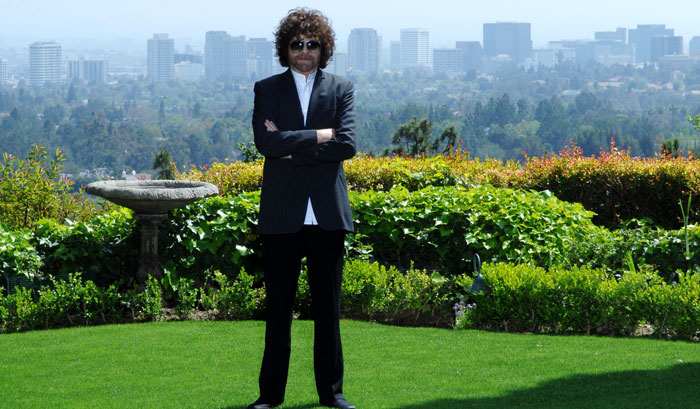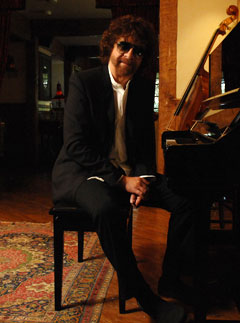


Had Jeff Lynne been merely a great bandleader, singer/songwriter, multi-instrumentalist, or producer, his place in the pop pantheon would be secure. But Lynne has excelled in all those areas, crafting four decades of great rock music distinguished by irrepressible hooks, manic energy, and glorious production.
Lynne grew up in Birmingham, England, where he made a splash as guitarist/vocalist and producer/songwriter for the Idle Race in the late sixties. In 1970 he joined the great British cult band the Move, where he co-produced, wrote songs, sang, played guitar and keyboards. The same year, he co-founded the Electric Light Orchestra with Move bandleader Roy Wood. When Wood left to form a new group, Lynne assumed control of E.L.O., writing, producing, and singing hit after hit throughout the decade. Even today it's hard not to be bowled over by the impact and innovation of "Evil Woman," "Mr. Blue Sky," or "Strange Magic," a song whose title perfectly summarizes the Lynne mystique.
As E.L.O. wound down in the '80s, Lynne was contacted by George Harrison to work with him on his album Cloud Nine. "We became great friends and I had the greatest of times doing that album", says Lynne. "It was while we were making the album that George suggested we should form a group. And to this day, George and me are the founding members of the Traveling Wilburys. A group I'm very proud to be in".
Writing and producing to me are kind of the same process. When I write a song, I'm already thinking about what sounds should be on it.
In 1990 Lynne unveiled his only solo album, Armchair Theatre, which was critically acclaimed. A few years later he worked with the three surviving Beatles on their Anthology compilations, transforming raw John Lennon demos into completed Beatles tracks.
You've always seemed to strive for the grandest possible sounds, even on your earliest records. What drew you to orchestras, choirs, and massive overdubs?
I used to think that more is more, I just loved to overdub. I thought that I could deliver the song better with a whole racket going on.

Why?
It's just the way I evolved as a songwriter, I suppose. I started out playing live every night in the Idle Race, and I loved that, a four-piece rock band with two guitars, bass, and drums. We were really tight. When we started recording I always wanted to add a few more instruments to my songs. Playing with that small line-up (even though we sounded good), made me want to get a bigger sound.
The Idle Race records almost sound like a blueprint for something you hoped to create someday.
That's absolutely right. Frankly, I didn't have the experience yet. I didn't quite know how to do what I wanted to do. When I did the second Idle Race album with Liberty Records, they said, "You need a producer," and I said, "No, I'm the producer." They believed me for some reason, even though I was only about twenty one and had never produced anything.
How did you pull it off?
I'd purchased the B&O tape recorder that let you bounce tracks from left to right and right to left adding a new instrument as you go. So I learned in the front room of my parents' house in Birmingham by making demos of my songs for the first Idle Race album just bouncing tracks back and forth, and waiting for the buses outside to go past so the rumble wouldn't get on the tape. Once you bounced the parts down, that was it--the only way to change the mix was to start from scratch. That's how I learned how parts work together. But even though I didn't understand about compression I was getting it anyway by overloading the tape. I knew how to create the harmonies I wanted by practicing on the B & O recorder.
How do you view the relationship between production and songwriting?
Writing and producing for me are kind of the same process.When I write a song, I'm already thinking about what sounds should be on it. Whether it should be a piano, an orchestra, whatever. Other ideas come as I'm laying down the tracks. I'll think, wow, a tuba would sound great here, or a xylophone.
Some of the production techniques you used with E.L.O. were unbelievably difficult with analog tape and no mixer automation. Now they're relatively easy, thanks to digital.
Yes, and it isn't entirely a good thing. You can do things with digital that you couldn't have done in a million years with analog. The problem is, digital doesn't yet sound as good, though it will one day. But I'm not complaining. The facilities of a digital recording system are amazing, and I could never go back to tape.
Like everyone else, I've gotten used to CD sound, and even to mp3 sound. Besides, sometimes you don't care too much about the sound quality--if you love the tune.
Which instruments do you tend to write on?
I tend to use piano for writing ballad-type songs with big fat chords, like "Telephone Line" and "I Can't Get It Out of My Head." I've got a nice nine-foot Yamaha concert grand that I've written many, many songs on. It's mellowed quite nicely over the years. I also like to write on guitar, usually for more for up-tempo songs like "Rockaria," "Showdown," and "Ma-Ma-Ma Belle." Sometimes I write on a Yamaha keyboard. I wrote a lot of E.L.O.'s Discovery album on a CS80, which was one of those magic Yamaha keyboards. The only problem was that it weighed something like 500 pounds! It had some great sounds, absolutely fantastic for its time. Another Yamaha keyboard that played a role along the way was the DX7. It was the first one small enough to take on your holidays with you.
You've worked with a number of your idols. Was it difficult to step into the producer's role?
Well, you've got to take charge and get it sounding how you want, or there's no point in your being there. Sometimes you do have to say, "I don't think that quite works," or "You'd better do that bit again." But it really is a thrill getting to work with your heroes. The record I did with Roy Orbison, "You Got It," is one of my favorites. I was so thrilled that I got to write it with him, record it, sing background vocals, mix it, and have it be a great big hit. It couldn't have been any better. Roy's voice was still great--a beautiful soft velvety sound that could suddenly soar like a bird. It was the same kind of thrill working with Del Shannon and Brian Wilson, people with outstanding voices. Tom Petty's Full Moon Fever is another one of my favorites that I co-wrote and produced. Working with the Beatles on Anthology was the most amazing experience ever, a lot harder, because there were three of them and only one of me. [Laughs.]
What was your role on Anthology?
To make records out of those two cassette tapes of John's, "Free As a Bird" and "Real Love"-- was the hardest job I've ever done, and one of the most fun. It had probably been more than twenty years since Paul, George, and Ringo were in the studio together. I sat there listening to their brilliant banter for hours. It was really funny. And then we had to get to work, and that was a little harder.
How Come?
I was given a mono cassette with John singing "Free As a Bird" with a piano. There was tons of hiss, and the piano was loud. This was 1995, and we weren't using a computer yet. It was impossible to play along to the cassette because it was a wild performance, so we wound up recording the track based on the average tempo, and then I flew John's voice and piano into it. After that, we added George and Paul singing harmonies. Doing the Anthology led to me producing eight songs on Paul McCartney's album Flaming Pie.
It wasn't the first time your career shadowed that of the Beatles.
It's hardly a shadow--it's more like a splat! [Laughs.] I love the Beatles dearly, totally, and absolutely. When I was doing my first album with the Idle Race, the engineer phoned and said, "Do you want to go down to Abbey Road? (actually I think it was called EMI in those days) The Beatles are in recording." I said, "Wha?!!!" We shot down there, got past the bloke at the door, and there they were, recording two different sessions for the White Album. I met John and George in the Studio Two control room. Through the window you could see George Martin hurling himself around as he conducted the string track to "Glass Onion." I said to myself, "listen to that snare drum sound!" It was all beyond my wildest dreams. Then we walked down the corridor, and there was Paul playing bass on "Why Don't We Do It in the Road?" Ringo was giving him a note on the piano. It was shocking to see the Beatles in the actual recording studio. It was like catching an unbelievable event in nature. I couldn't believe my luck.
So do you still feel a desire to make everything sound massive these days?
I think I got over it. I used to have to make everything enormous to make it feel like a proper record. I always used to imagine that all the records I loved were enormous as well. It was only years later that I could listen to the old singles I loved and realize that there was almost nothing on them! The huge sound I imagined didn't exist. I've learned so much since then. Thank goodness--I'd be a bit of a dummy if I hadn't! Obviously, the more experience you have and the more records you produce, the more ideas you have. There are still millions of songs waiting to be done. It's just a matter of writing them.
























